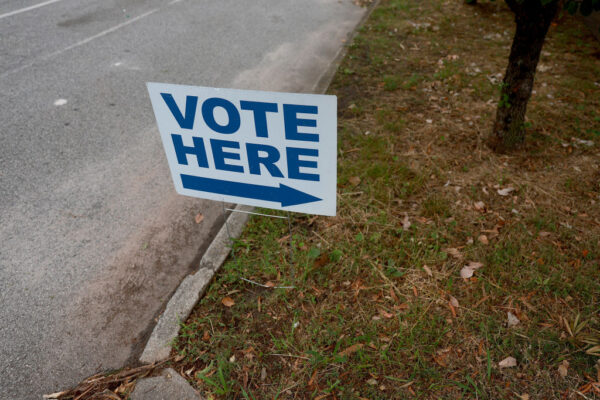‘We’ve Been Doing It for Years’: Georgia’s Ban on Food, Water at Polling Sites Could Hit Harder In Black Neighborhoods. Advocacy Groups Challenge It In Federal Court
Voting advocacy groups have asked a federal judge to strike out a provision in Georgia’s revised voting law that prohibits people from giving away food and water to Georgians waiting in lines to vote.
The rule, which became law through Senate Bill 202 in March 2021, makes it a misdemeanor to hand out refreshments within 150 feet of the outer edge of a polling place or within 25 feet of any voter in line. Those who violate the law can face up to a year in jail and a $1,000 fine.
Voting rights groups argue to the court that the provision violates freedom of speech rights. It has been highly criticized for its potential to disproportionately impact Black and low-income voters. The state and supporters of the measure said it targets illegal campaigning or vote-buying. The previous law banned candidates and campaigners from doing food and drink giveaways.
“Georgia. S.B. 202 is a 21st-century piece of legislation, but at the root, it is nourished by the same soil that produced literacy tests, grandfather clauses and counting jelly beans in a jar. The slyness of the bill’s language should not distract from the severity of its impacts,” said Andrea Young, executive director of the ACLU of Georgia in a statement.
The proceedings come months before the November election that pit incumbent Republican Gov. Brian Kemp and Democrat Stacey Abrams against each other. It’s a rematch four years after Abrams accused her opponent, the former secretary of state, of depriving Black and low-income people of their right to vote. In another hotly contested race, Republican Herschel Walker is challenging incumbent U.S. Sen. Raphael Warnock, a Democrat.
Opponents of the food and water ban said the giveaways allow voters to stay in lines longer because of the comfort of having access to food. They blame Republicans for the long lines, mostly in metropolitan Atlanta, where non-white voters have started to outnumber white voters based on districting data. They accuse Republicans of disproportionately closing poll places in several Black neighborhoods. Voters reported waiting at times six or more hours in line.
“Line relief constitutes core expressive conduct,” said Davin Rosborough, an American Civil Liberties Union lawyer. “Its meaning is well understood in communities where plaintiffs provide it.”
Rhonda Briggins of the Delta Sigma Theta sorority told The Associated Press the Black Greek organization has handed out food and water to voters in previous elections, but has canceled the efforts since the law passed.
“We’ve been doing it for years,” Briggins said. “It is to encourage people to stay in line. We’re the cheerleaders.”
Nate Mook of World Central Kitchen said the refreshments also initiate conversations among people in the queue and create a sense of community. World Central Kitchen and other humanitarian groups have provided free food and water for years at polling precincts.
“People told us, right off the bat, like ‘This is amazing, I can stay in line now. I don’t need to go get food or feed my kids who are with me,’ ” Mook told The Washington Post. “That was something we actually heard quite frequently.”
However, state election board member Matt Mashburn said he witnessed Democrats providing food while also controlling the line outside a Cobb County polling precinct while working as a Republican poll watcher.
“My reaction to that is, we’ve completely lost control of the precincts,” Mashburn said. “And when the voters see the poll workers have lost control, it makes them very nervous for their own safety and makes them nervous that somebody’s cheating.”
Proponents of the rule said the law allows organizations to donate water to polling managers and make it available to voters. The bill says polling stations can set up “self-service water from an unattended receptacle to an elector waiting in line to vote.”
Voting rights groups also contend that other reforms in the overarching bill lengthen lines at polling sites, such as new voter ID requirements and shorter deadlines for absentee ballots.
Rosborough of the ACLU said that Georgia “stands alone” as the only state to ban and criminalize the passing out of water and food.
Some other states have restrictions. Montana prohibits candidates, their family members and campaigners from giving out food, drinks “or anything of value” to voters on election days. Food and drink giveaways at polling places in New York State are restricted to items that are less than one dollar.
The plaintiffs also argue that Georgia should enforce laws on the books that already ban the exchange of money and gifts for votes and could modify the law to limit the value of the food and water allowed.
Ryan Germany, chief legal counsel for Secretary of State Brad Raffensperger, said that would put the burden of deciphering what is allowed on poll workers. State lawyers said the ban is more straightforward.
“It’s a bright line rule,” said lawyer Gene Schaerr. “No one has to decide how much is too much.”

